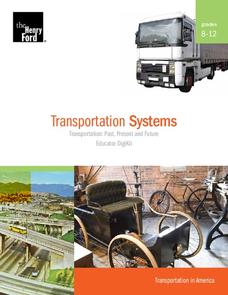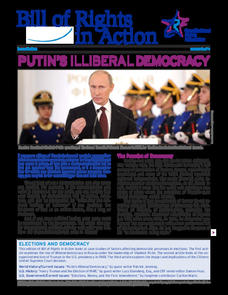Albert Shanker Institute
Heart of the Matter
Most people have heard of Dr. Martin Luther King, Jr. and his famous "I Have a Dream" speech, but few have heard of Philip Randolph and Bayard Rustin. Who were these guys and what did they have to do with this famous landmark event in...
Echoes & Reflections
Jewish Resistance
Resistance to the Holocaust took on many forms. Learners explore the passive and active resistance of Jewish people who continued their practices and observances, as well as organized resistance against the evils of the Nazis. An...
Echoes & Reflections
The "Final Solution"
Nazi policies shifted from deportation and imprisonment to extermination of the Jewish people in death camps in the "Final Solution." Learners examine photos of artifacts, read poetry written by survivors, analyze testimony from...
Echoes & Reflections
Survivors and Liberators
The end was just the beginning. The period immediately after the end of World War II and the Holocaust is often called "The Return to Life" as survivors looked to reunite and recreate broken families and shattered lives. A two-lesson...
Echoes & Reflections
Nazi Germany
The Holocaust was an evolution of anti-Semitism, scapegoating, and targeted violence against Jews with Nazi policies. A resource unpacks the escalation in violence, along with the erosion of democratic institutions, during the 1930s....
Echoes & Reflections
The Children and Legacies Beyond the Holocaust
Using video testimony, primary source documents that detail international agreements, and structured discussions, learners consider the precarious position of children during the Holocaust and other international conflicts, and how to...
Echoes & Reflections
Rescuers and Non-Jewish Resistance
What does it mean to be a rescuer during the time of the Holocaust? Learners consider the role of those who resisted the Nazi invasions, including hiding Jewish people, throughout Europe. Activities include listening to the testimony of...
Echoes & Reflections
The Ghettos
Young historians examine primary sources, including diaries, poems, and photographs, to consider the conditions in the ghettos and how they fit into the escalation of the Third Reich's plot against the Jewish people.
Echoes & Reflections
Studying The Holocaust
While many young scholars are familiar with the Holocaust, they may not understand the specific history that led to the unprecedented atrocity. The first lesson in the unit helps teachers gauge their pupils' background knowledge. A...
Los Angeles Unified School District
Capitalism and Socialism
Capitalism, socialism, communism ... these may seem like a whole bunch of isms to your scholars. High schoolers won't confuse them after completing an informative resource. Your class masters how to use primary sources to...
Henry Ford Museum
Transportation Systems
Learners analyze the evolution of cultural attitudes through the lens of transportation, examining several artifacts, documents, and photographs. Topics covered include how American attitudes have influenced society's evolution into a...
Albert Shanker Institute
Strategizing for Freedom
Booker T. Washington, W.E.B. DuBois, Marcus Garvey, and A. Philip Randolph developed different views on how to advance civil rights for African Americans. Class members research these famous figures and their strategies before developing...
Constitutional Rights Foundation
The Dispute Over the South China Sea
Just who owns the South China Sea—and its vast resources—has been a conundrum for decades. Pupils explore the international law and disputes surrounding the resource-rich body of water, as well as China's claims over it. A background...
Constitutional Rights Foundation
The Troubled Elections of 1796 and 1800
Congress does more than create new laws. Political scientists delve into the elections of 1796 and 1800 to understand how political parties, the Electoral College, and personal agendas affected the election process. The resource also...
Constitutional Rights Foundation
The Iran Nuclear Deal and Its Critics
What was the purpose of the Iranian Nuclear Deal? An insightful resource explains nuclear tensions in the Middle East and Iranian weapon development that contributed to the Nuclear Deal in 2013. Academics learn the agreement limited...
Constitutional Rights Foundation
Global Warming and the Paris Agreement
Global warming: a political debate or a scientific fact? Young historians read text, complete activities, and participate in group discussion to understand the political debate surrounding global warming and the US decision to withdraw...
Constitutional Rights Foundation
Automation and the American Worker
A thought-provoking resource examines the future of automation and the effects on employment. Academics read informational text, complete written prompts, and participate in activities to understand automation and the possibilities for...
Constitutional Rights Foundation
Putin's Illiberal Democracy
Is Russia really a democracy? High school scholars explore Russian democracy under the leadership of President Putin. The resource provides opportunity for group discussion, writing, and research to understand Russia's political history,...
Constitutional Rights Foundation
Suppressing the Vote
Voting rights have expanded over time, but some voters are still being suppressed. A thought-provoking resource explores the history of voter suppression in the US and efforts to remove roadblocks to voting. Young historians learn about...
Constitutional Rights Foundation
Purged From the Voter Rolls: Husted v. A. Philip Randolph Institute
Once a registered voter isn't always a registered voter. Academics explore the topic of voter registration and hindrances to remaining registered. The resource focuses on data analysis, federal voter registration law, and Supreme Court...
Constitutional Rights Foundation
The Census in US History
The census has been a part of the American landscape since the Constitution was written; however, it does have a history of controversy. Class members use a guided reading and simulation activity on developing census questions to...
Echoes & Reflections
Contemporary Antisemitism
Despite the recognized atrocities of the Holocaust, anti-semitism continues. The 11th and final installment of the Teaching the Holocaust series explores the long-term effects of the Holocaust on modern anti-semitism, asking pupils to...
Echoes & Reflections
Perpetrators, Collaborators, and Bystanders
After the Holocaust, the world grappled with how to bring justice to the Nazis. But what to do with the thousands—if not millions—who allowed it to happen? Young historians consider the issues of guilt, collaboration, and responsibility...
Echoes & Reflections
Antisemitism
Propaganda and anti-semitism were linked to evil ends during the Holocaust. Using video testimony of Holocaust survivors, examples of Nazi propaganda, and discussion questions, learners explore the roots of anti-semitism in Europe and...

























